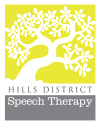Developmental Stuttering
Developmental stuttering, the most common form of stuttering, is a disruption in the fluency or rhythmic flow of speech. It often appears during early childhood between the ages of 2-4, and can persist into adulthood if natural recovery or early intervention have not taken place.
About Developmental Stuttering in Adults
Stuttering is prevalent in approximately 1-2% of the Australian adult population. Adults with developmental stuttering may present with one or a combination of the following characteristics of disfluent speech:
- REPETITIONS of sounds, syllables, words or phrases. E.g: b-b-b-baby; baby-baby-baby; that’s my- that’s my baby
- PROLONGATIONS: Where words or sounds are lengthened or stretched out e.g. mmmmore
- BLOCKS: Moments of silence when no sounds come out, usually with tension
- SECONDARY FEATURES: Non-verbal movements can also be associated with a stutter. E.g. excessive blinking, head movements, facial grimacing
There is a growing body of B Grade, ‘Good’ quality evidence (using the NHMRC grading system) and support from Speech Pathology Australia indicating that speech restructuring treatments are effective in controlling stuttering in adolescents and adults with developmental stuttering. At Hills District Speech Therapy, we offer our adult stuttering clients an evidence-based, speech restructuring treatment – The Camperdown Program. We also advise clients receiving stuttering treatment to also connect with other adults who stutter through self help groups such as the Australian Speak Easy Association (see link below).
About the Camperdown Program
The Camperdown program is a behavioural treatment which has been developed for adults who stutter. The treatment technique used is ‘Prolonged Speech’ which is taught without reference to traditional descriptions of speech targets –unlike other programs such as ‘Prolonged Speech’ or ‘Smooth Speech’. Instead, clients are encouraged to use whatever features of the Prolonged Speech pattern they require to control their stuttering and are free to individualise their speech pattern. There are four stages in the program:
- Stage 1 – Teaching of treatment Components
- Stage 2 – Instatement of Stutter-free speech within treatment environment
- Stage 3 – Generalisation of stutter-free speech into everyday situations
- Stage 4 –Maintenance of stutter-free speech
Acquired Stuttering
Acquired stuttering refers to a group of fluency disorders with a non-developmental origin. There are three broad types of acquired stuttering:
- Neurogenic Stuttering: disfluency resulting from neurological damage.
- Drug-induced Stuttering: a side effect from taking certain medications.
- Psychogenic Stuttering: disfluency associated with a psychological impairment or after experiencing emotional trauma; likely a combination of neurogenic and drug-induced stuttering.
At Hills District Speech Therapy, we largely provide assessment and intervention services for clients presenting with a diagnosis of or suspected neurogenic stuttering.
About Neurogenic Stuttering
Neurogenic stuttering is the sudden onset of disrupted and effortful speech following an identifiable injury or disease to the brain such as a stroke, traumatic brain injury, tumour, degenerative disease (e.g. Parkinson’s disease, multiple sclerosis) or infection(e.g. meningitis). Neurogenic stuttering can affect anyone during their lifetime , however is more prevalent amongst the elderly. Individuals can present with both developmental and neurogenic stuttering. Our Speech Pathologists are trained to assess and work closely with clients and their families to manage neurogenic stutters using a range of strategies and techniques. For more information or to book in a consult with one of our clinicians, call us on 9054 1996 or email bookings@hdspeechtherapy.com.au.
